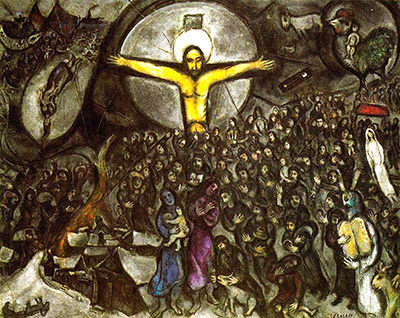Torah: Vayikra 26:3 – 27:34; Haftarah: Yirmiyahu (Jeremiah) 16:19 – 17:14
The Blessings and the Curses
The previous Parashah, Behar, ends with an instruction that distills all other commandments into two basic principles:
Et Shabbtotay tishmoru u’mikdashiy tirau, ani YHVH. "You shall observe My Shabbats, and revere My Sanctuary; I am the LORD." Vayikra (Leviticus) 26:2
Observing the Shabbats and having reverence for His Sanctuary are the prerequisite of starting to live a holy life. The Shabbats are in the plural form because it is a reference not only to the weekly Shabbat but also to the other seven Holy Days previously enumerated in chapter 23. Reverence for the Sanctuary is not reverence for the building or the objects within it, but for what they represent and ultimately for God.
These instructions for a holy life apply to us also. Yes, “by grace you have been saved through faith; and that not of yourselves, {it is} the gift of God” Ephesians 2:8 but, even though we have been saved by the shed blood of our Messiah Yeshua — and no amount of mitzvoth can earn this salvation — our walk as believers must be guided by the holy instructions of our Holy God. “But someone may say, ‘You have faith and I have works.’ Show me your faith without the works, and I will show you my faith by my works." James 2:18
Our faith is reflected in our mitzvoth; faith without mitzvoth is dead, but the greater the faith the greater mitzvoth we can perform as a natural outcome of faith. Just as the life of sin and disobedience will have an impact on our physical world and leave scars in our lives and in the lives of people around us, so, too, a life lived in obedience to God’s instructions will have an impact, not only on our lives, but also, in the lives of people around us and it will be like an offering of sweet aroma to God.
This week's Parashah, beChukotai - "By My regulations," contains the blessings for obeying God's teachings and the curses for abandoning them. "If you walk in My statutes, and keep My commandments, and do them, then I will give you rain in due season, and the land shall yield her produce, and the trees of the field shall yield their fruit. And your threshing shall last to the time of vintage, and the vintage shall last to the sowing time; and you shall eat your bread to the full, and dwell in your land safely. And I will give peace in the land, and you shall lie down, and none shall make you afraid; and I will remove evil beasts from the land, nor shall the sword go through your land. And you shall chase your enemies, and they shall fall before you by the sword. And five of you shall chase a hundred, and a hundred of you shall put ten thousand to flight; and your enemies shall fall before you by the sword. For I will turn Myself to you, and make you fruitful, and multiply you, and establish My covenant with you. And you shall eat old store, and remove the old because of the new. And I will set My Tabernacle among you; and My soul shall not loathe you. And I will walk among you, and will be your God, and you shall be My people. I am the LORD your God, who brought you out of the land of Egypt, that you should not be their slaves; and I have broken the bars of your yoke, and made you go upright." Vayikra (Leviticus) 26:3-13
Please read the above passage again; the blessings are so overwhelmingly beautifully laid out. The blessings and the curses are all hidden miracles, but both are a testimony that God is the provider of our physical as well as our spiritual needs – "man does not live by bread alone, but man lives by everything that proceeds out of the mouth of the LORD" (Devarim 8:3).
The spiritual life is intertwined with the physical one, therefore, there is no need for the Torah to state that people who engage in spiritual pursuits and serve God faithfully should receive spiritual rewards; it seems natural that spiritual accomplishments should bring spiritual rewards. But it is not natural that the performance of the mitzvoth should earn for an entire nation good health, prosperity and triumph over her enemies. It is not natural that the observance of Shemittah, for example, will enable a hundred Jews to pursue ten thousand enemies, and that the violation of the Yovel will cause the nation to be exiled and be helpless as it did for 70 years in Babylon. The Torah’s intention, therefore, is to teach that obedience to God is of such magnitude that the blessings resulted from it may seem as miracles, defying the laws of nature.
What is interesting about the curses is that they are in direct correlation with our attitude towards God: "But if you will not listen to Me, and will not do all these commandments, and if you shall despise My statutes, or if your soul loathes My judgments, so that you will not do all My commandments, but that you break My covenant, then I will do the same to you," continues the Biblical text. If we do not listen to God, if we despise His statutes, ignore His commandments, and if we loathe His judgments, He will do the same to us; He will not listen to us, to our prayers, He will despise us, and He will loathe us. The choice is ours.
A person without obeying God’s laws becomes a lawless person. May none of us do these things but learn obedience to God.
We need to imitate Yeshua’s holy life and we need to heed His words: “Take My yoke upon you and learn from Me, for I am gentle and humble in heart, and you will find rest for your souls” Matthew 11:29
Taken someone’s “yoke” is a rabbinical expression of submitting to his teachings. Yeshua came on this earth for only one purpose, to do God’s will; and God’s will is to restore our fellowship with Him. If we follow Yeshua’s teachings we will find rest for our souls and the blessings of a holy life lived by obeying His teachings will seem miraculous.
This Parashah concludes the book of Vayikra and it is a tradition for the congregation to stand and recite:
Chazak! Chazak! Venitchazeik! Be Strong! Be Strong! And may we be strengthened!
Shabbat joy, peace, and blessings! Shabbat Shalom!



